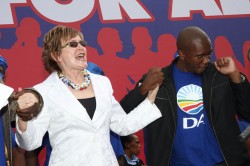JOHANNESBURG, April 18 (Reuters) – The charismatic black parliamentary leader of South Africa’s Democratic Alliance (DA) on Saturday announced he would campaign for the leadership of the historically white opposition party.

Photo credit: The Democratic Alliance / Foter / CC BY-SA
Born in the black township of Soweto, outside Africa’s economic hub Johannesburg, Mmusi Maimane, 34, is seen as a front runner in the race and his election could help the party expand its support base beyond South Africa’s white minority.
The DA’s leader of eight years, Helen Zille, 62, announced last week that she will be stepping down, after leading the party to win 22 percent of the vote in the 2014 election, its best performance.
Announcing his campaign in Cape Town, where the DA leads the Western Cape provincial government, Maimane said his aim was to boost support for the party across South Africa’s nine provinces. The DA chooses new leaders at an electoral conference on May 9.
Richard Calland, a political analyst from the University of Cape Town, said despite Maimane’s youth and relative inexperience in the party, his appointment could broaden the DA’s electoral appeal.
“They got the majority of the minority in terms of the electorate, what they now have to do is make greater, quicker progress in terms of the black African majority,” Calland said.
“I don’t think it is essential to have a black leader but I think it is important to – and it is time.”
Maimane’s rise to prominence began in 2011, when he became the party’s national spokesman. In the 2014 national elections, he lost his bid to lead the provincial government of South Africa’s richest province, Gauteng, but shortly afterwards took up the position of the DA’s parliamentary leader.
He is a vocal critic of President Jacob Zuma and his administration, with the DA alleging that corruption has increased under the African National Congress (ANC) government.
He was forced to withdraw a comment he made in parliament during a vote of no confidence this year, when he called Zuma “a thief” who should pay back part of $23 million state-funded security upgrade of his rural home.
South Africa holds what are expected to be tightly contested local government elections in 2016, with the ANC already under pressure after its share of the vote in the Johannesburgprovince, Gauteng, slipped by almost 10 percentage points to 53 percent at last year’s national election. (Reporting by Peroshni Govender; Editing by Rosalind Russell)
#DACongress Political analyst, Keith Gottschalk, says if Maimane becomes the DA’s leader it could improve their national standing. MM
— EWN Reporter (@ewnreporter) April 18, 2015
#DACongress Mayor Patricia de Lille says Maimane has shown enormous growth in his position as parliamentary leader. MM
— EWN Reporter (@ewnreporter) April 18, 2015

